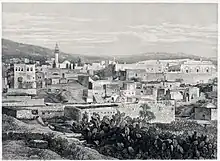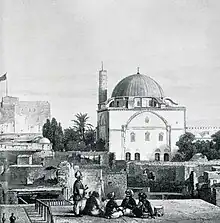Frédéric Goupil-Fesquet | |
|---|---|
.jpg.webp) Jerusalem, Fesquet. Dec. 1839. | |
| Born | Frédéric Goupil-Fesquet 1817 Paris, France |
| Died | 1878 Paris, France |
| Known for | photography, painting |
Frédéric Goupil-Fesquet (1817–1878) was a French painter and photographer, who took the first ever photograph of Jerusalem, during a trip he made from France in 1839.[1][2][3]
Journey to Jerusalem
In October 1839, Goupil-Fesquet sailed from the port of Marseille to Alexandria in Egypt on a photographic expedition. A few months earlier, on August 19, 1839, Daguerre published the daguerreotype method of photography. Fesquet's journey was Innovative since he carried photographic equipment with him, studied briefly the fundamentals of photography and took pictures in some places that were not photographed before. He went on a journey with a large format camera, a tripod, and many boxes. In the boxes were stored photographic metal plates, and many chemicals that served him on a journey of several months.[4][5]
Until the development of photography, people read about famous sites in the world and had to be content with written descriptions or illustrations and drawings of the sites. The development of photography enabled the distribution of photographs of the sites. Those photographs were a revolution for the general public, who were unable to visit the famous sites in those days. (Only a small percentage of the population was able to travel to foreign countries at that time).
As part of this passion for photographs for famous sites, Noël Paymal Lerebours,[6] a French painter and photographer, turned to producing photo stories. He is the one who provided Fesque with the camera he used during that journey.[7] The cameras that were used during this period were large-format cameras. ("5x7 in this case).
On the trip, Fesque accompanied his uncle the French painter Horace Vernet[8][9][10] who was his painting teacher,[11] and also tried shooting pictures. Some of the sources indicate that the cousin Charles Marie Bouton also joined and other sources indicate that Pierre-Gustave Joly de Lotbinière participated in part of the journey.[12]

The sailing voyage ended in Alexandria, Egypt, from where the delegation continued to Cairo and farther south to take photographs at the Pyramids and various other sites.
From Cairo, the delegation traveled by land to Jerusalem, where they stayed from December 11 to 14, 1839.[1] During these days, Fesque photographed Jerusalem from the Mount of Olives, including the Temple Mount, the city walls, and its surroundings.[13][14] From Jerusalem the expedition continued to Acre, where Fesque photographed the old city on its rooftops, the people staying there, and the Crusader fortress in the background. Finally, he photographed the city of Nazareth and its surroundings. From Nazareth, the delegation continued to Damascus, Turkey, and returned to Paris at the beginning of 1840.

Upon his return from the trip, Fesque did not publish any more photographs and focused on painting. There is no evidence since of any use of a camera by him.
Works
Fesque was known as a painter, and his short activity as a photographer, while he was very young with no experience derived few photographs that were popular at that time due to the demand for pictures of famous sites. his work was displayed in the Le Salon de Paris.[15]
References
- 1 2 "A New Art in an Ancient Land: Palestine through the lens of early European photographers". Institute for Palestine Studies. Retrieved 9 December 2023.
- ↑ "ראשית הצילום בארץ ישראל". מסע אחר (in Hebrew). Retrieved 9 December 2023.
- ↑ Raz, Guy (2003). Photographs of Palestine Eretz Israel 1855-2000 (in Hebrew). Map-Mapping and Publishing & Hkibbutz hameuchad. pp. 255, 269. ISBN 965-7184-45-2.
- ↑ "Goupil-Fesquet, Frédéric Auguste Antoine - Egypt - Travellers' Views - Places – Monuments – People Southeastern Europe – Eastern Mediterranean – Greece – Asia Minor – Southern Italy, 15th -20th century". eng.travelogues.gr. Retrieved 9 December 2023.
- ↑ "ראשית הצילום בארץ ישראל - ישראל". מסע אחר (in Hebrew). Retrieved 9 December 2023.
- ↑ "Noël-Marie-Paymal Lerebours | Excursions Daguerriennes. Vues et monuments les plus remarquables du globe". The Metropolitan Museum of Art. Retrieved 9 December 2023.
- ↑ "Photographer - Frederic Goupil Fesquet". luminous-lint.com. Retrieved 9 December 2023.
- ↑ "Horace Vernet - 52 artworks - painting". www.wikiart.org. Retrieved 9 December 2023.
- ↑ "Discover lithographer, painter, draftsperson Horace Vernet". rkd.nl. Retrieved 9 December 2023.
- ↑ "Carle Vernet | Romanticism, Landscapes, Genre Scenes | Britannica". www.britannica.com. 23 November 2023. Retrieved 9 December 2023.
- ↑ "Discover watercolorist, graphic artist, painter Frédéric Goupil-Fesquet". rkd.nl. Retrieved 9 December 2023.
- ↑ "North African Brigands and Arab, Circa 1845". Library of Congress, Washington, D.C. 20540 USA. Retrieved 9 December 2023.
- ↑ "Frédéric Goupil-Fesquet (The J. Paul Getty Museum Collection)". The J. Paul Getty Museum Collection. Retrieved 9 December 2023.
- ↑ "מדעיכת העותמאנים ועד לשמלה של מירי רגב: מסע באלבום התמונות של הר הבית". הארץ (in Hebrew). Retrieved 9 December 2023.
- ↑ Raz, Guy (1993). Ṣalamey haʾareṣ: mereʾšiyt ymey hạsiylwm wʿad haywm. Tel-ʾAbiyb Bney-Braq: Mapah - miypwy whwṣaʾah laʾwr Hwṣ. haQiybwṣ hamʾwḥad. ISBN 978-965-7184-45-5.
References
https://commons.wikimedia.org/wiki/Category:Fr%C3%A9d%C3%A9ric_Goupil
Fesque Paintings in Artnet Site.
Fesque painting in Invaluable site